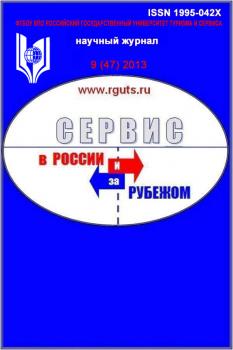Sankt-Peterburg, Russian Federation
The article is dedicated to the improving the methodical approach to the assessment of service competitiveness provided by service organizations. The author considers the concept of service competitiveness and quality, analyzes the scientific literature and existing methods for assessing competitiveness grouped into three groups. The article substantiates the use of the scale of pairwise comparisons and rating scales for determining the significance of characteristics, and gives result of their comparative analysis. The formulas for determining the importance of characteristics are given. The author offers to use marketing scales for the assessment of relationships, when surveying respondents. For example, the Likert scale, the semantic differential, the Stepel scale, and the graphic scales should be used for evaluating the qualitative indicators of services. The article gives the sequence of determining the relative level of each characteristic of the service in question in comparison with the selected basic service. A new element is the methodology of scaling norms proposed in the article, which makes it possible to evaluate the parameters of the service more accurately. The author makes the values of the characteristics of service competitiveness comparable in the normalization of scales. The purpose of rating scales is that the ranges of possible variation of each characteristic should be the same, and accordingly the change in each characteristic relative to the base services should be perceived equivalent. The article gives and justifies the computational formulas of the competitiveness coefficient by non-economic indicators or the service rating. The author offers estimation of economic parameters of service provided by company, and calculation of the competitiveness coefficient by economic indicators. The integral coefficient of competitiveness is given.
competitiveness, service, the service, method, scale, coefficient
1. Bagiev G.L. Formirovanie koncepcii marketinga prostranstvennogo vzaimodeystviya // Vestnik Yuzhno-Ural'skogo gosudarstvennogo universiteta. Seriya: Ekonomika i menedzh-ment. 2015. T.9. №1. S. 146-152.
2. Moiseeva N.K., Badorina A.A. Preobrazovanie marketingovyh kommunikaciy na osnove ocenki kachestva vzaimodeystviya v otraslevoy sisteme sbyta // Promyshlennyy i b2b marketing. 2016. №1. S. 44-55.
3. Kotler F., Keller K.L. Marketing. Menedzhment. SPb.: Piter, 2015. 800 s.
4. Porter M. Konkurentnaya strategiya: Metodika analiza otrasley i konkurentov. M.: Al'-pina Pablisher, 2011. 454 s.
5. Porter M.E., Kramer M.R. Strategy and Society: The Link Between Competitive Advantage and Corporate Social Responsibility // Harvard Business Review. 2006. Vol. 12. Pp. 78-92.
6. Coy M.E., Schekoldin V.Yu. Sovremennye metody issledovaniy v marketinge // Marke-ting. 2014. №2. S. 19-31.
7. Titova V.A., Coy M.E. Tehnologiya provedeniya marketingovogo issledovaniya. Novosi-birsk: NGTU, 2011. 80 s.
8. Nazarkina V.A. Issledovanie konkurentosposobnosti torgovyh firm na rynke farma-cevticheskoy produkcii: Diss. … kand. ekon. nauk. Novosibirsk: Sibirskiy un-t potrebi-tel'skoy kooperacii, 2000.
9. Rozumnaya N.V., Klyuha A.K. Konkurentnye strategii predpriyatiy: sovremennye aspekty // Sovremennaya nauka: issledovaniya, tehnologii, proekty. Sb. V mezhdunar. nauch.-prakt. konf. Nauchnyy centr "Olimp". 2015. S. 611-614.
10. Rozumnaya N.V. Sovremennye napravleniya innovacionnogo razvitiya marketingovyh kommunikaciy // Uspehi sovremennoy nauki i obrazovaniya. 2016. T.3. №9. S. 80-82.
11. Vinogradova M.V., Vasil'eva L.A. Ocenka konkurentosposobnosti predpriyatiy sfery servisa // Servis plus. 2009. №4. S. 34-40.
12. Bol'shakov A.S. Integral'naya ocenka raboty servisnoy organizacii: kompleksnyy pod-hod // Ekonomika i upravlenie v sfere uslug: sovremennoe sostoyanie i perspektivy razvitiya: Materialy konferencii. SPb.: SPbGUP, 2008. S. 32-35.
13. Paramonova T.N. Raschet konkurentosposobnosti tovara. 2010. URL: http://www.ippnou.ru/article.php?idarticle=009014 (Data obrascheniya: 12.03.2017).





